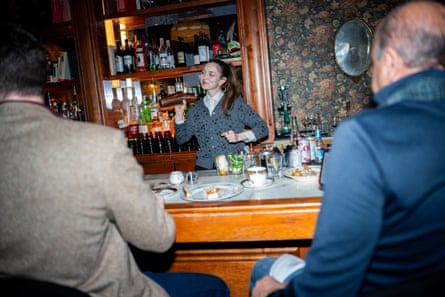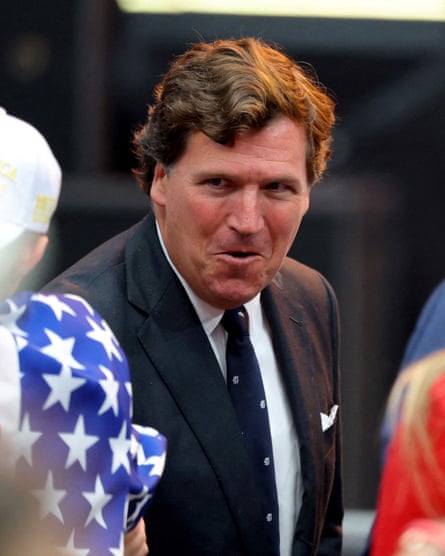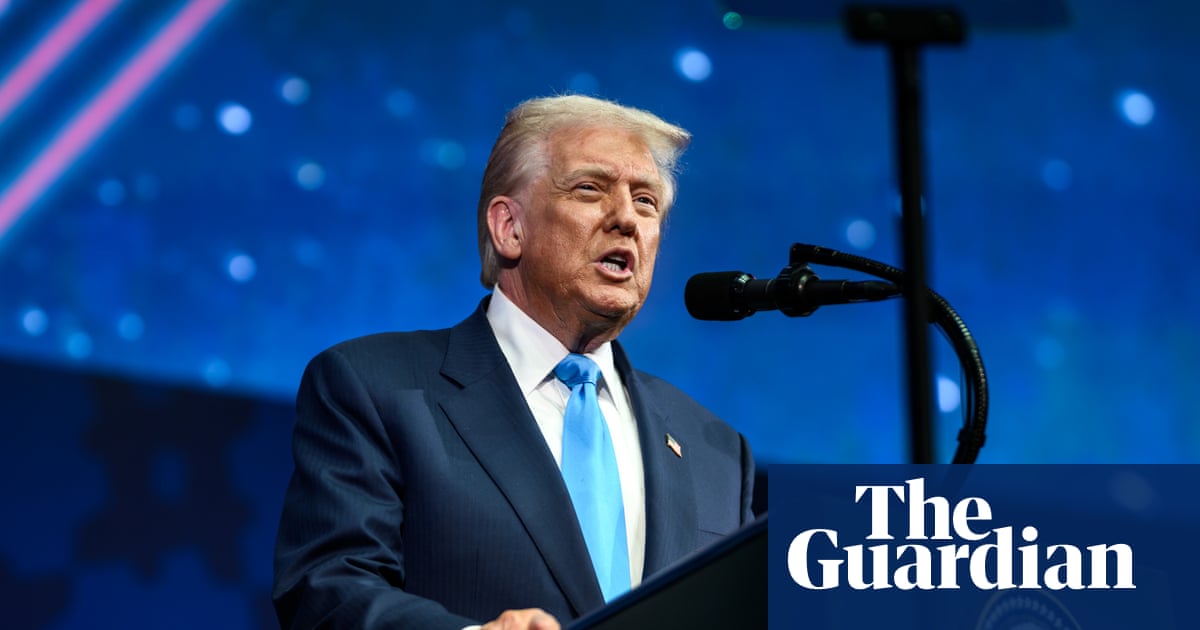Butterworth’s, an eclectically decorated restaurant in Washington DC, is an unofficial lounge of the Maga elite. A nameplate on one table declares it the official “nook” of Raheem Kassam, the former adviser to the rightwing British politician Nigel Farage and a co-owner of the restaurant. Steve Bannon is also frequently sighted holding court over Carolina gold rice – though the signature dish is bone-marrow escargot, which some young Maga politicos swear is good for your collagen.
When he opened the farm-to-table brasserie in 2024, Bart Hutchins, Butterworth’s chef and one of its partners, was determined to resist what he sees as “the new puritanism” of wellness and sobriety culture. Hutchins finds non-alcoholic “mocktails” annoying on principle. “I did this edict, where I was like, ‘I’m not stocking that stuff,’” he said. “If you want to drink a glass of juice, just ask for a glass of juice; I’m not gonna pretend it’s a cocktail.”
Hutchins has never felt teetotalism’s temptation, he told me, and his memory of drinks marketed as alcohol alternatives, like the near-beer O’Doul’s, was that they were “terrible”. But lately, as more Republican staffers, pundits and politicians patronize Butterworth’s antler-bedecked environs, a fifth column of non-drinkers has quietly undermined his anti-mocktail edict.
It’s not just at Butterworth’s where rightwingers are drinking less. A Gallup poll in August found that the share of Americans of any political stripe who say they consume alcohol is at its lowest in nearly 90 years – though by only one percentage point. More strikingly, Republicans are the group, of the many demographic cohorts measured, that has turned most aggressively to sobriety.
Gallup, which has asked Americans about their alcohol use since the 1930s, found in 2023 that 65% of Republicans said they drink alcohol – about the same as Democrats and independents. Just two years later, in 2025, that number has plunged a staggering 19 points to 46%. Democrats and independents also report drinking less, but each only by single digits. (All the results are self-reported; Gallup took participants at their word.)
The decline is surprising and “statistically significant”, Lydia Saad, the director of US social research at Gallup, told me – though she has “no real hypothesis” for the sudden rise of Republican teetotalism.

Laurence Whyatt, an analyst at Barclays who covers the beverage industry, “can’t explain it” either. He suspects the broader US decline in drinking may have to do with pandemic-era inflation and belt-tightening and may not last. “But there’s no obvious reason why Republicans would be drinking less,” he said. “Of course, I’m aware that some prominent Republicans don’t drink. Could that be the reason?”
Yet theories abound. Perhaps this is another manifestation of the cult of personality around Donald Trump, a Diet Coke enthusiast. Maybe the rising tide of Christian nationalism has revived an old-fashioned Protestant temperance. Or perhaps red-blooded rightwingers, eager to “Make America healthy again”, are eschewing beer, barbecues and bourbon to become the sort of smoothie-drinking health nuts they might once have mocked.
Prominent rightwing or right-adjacent abstainers include Trump himself, whose older brother died of alcoholism-related heart attack; Robert F Kennedy Jr (who has spoken about his own substance problems); Tucker Carlson (a recovering alcoholic); and the activist Charlie Kirk (for health reasons). JD Vance drinks, but his predecessor Mike Pence, a devout born-again Christian, did not. Joe Rogan, the podcaster and gym-bro whisperer who endorsed Trump in 2024, quit drinking this year for health reasons.
“None of my core team [of colleagues] under 30 drinks,” Bannon, who hosts the podcast War Room, said in a text message.
The War Room’s 24-year-old White House correspondent, Natalie Winters, does not drink for health reasons – nor wear perfume, consume seed oils or drink fluoridated tap water. Earlier this year a friend of hers told the Times of London that elective sobriety had become common and accepted in rightwing political circles. “Here you don’t second-guess,” the friend said. “In London if someone isn’t drinking, you think they have an alcohol problem. Here it’s either that, or they’re Mormon, or because they’re focused on health.”
Carlson, speaking to me by phone as he returned from grouse hunting with his dogs, said he had noticed that young conservatives, particularly men, were far more health-conscious than they once were. When he came up as a journalist, he said, the milieu was awash in booze and cigarette smoke. “I’m just from a different world. When I was 25, the health question was ‘filter or non-filter?’” he said. “And I always went with non-filter.”
Carlson quit drinking in 2002, after a spiral whose nadir saw him having two double screwdrivers for breakfast. He said he was surprised – but happy – to see people today, even those who are not problem drinkers, quitting or moderating their consumption. The Athletic Brewing Company’s alcohol-free beers are popular, he has noticed, and not just among “sad rehab cases like me. I think it’s normal young people.”
Carlson – who has recently offered a range of unorthodox health advice including using nicotine to improve focus and testicle tanning to improve testosterone levels – says political professionals and journalists today also inhabit a 24/7 news cycle in which “there’s just, substantively, a lot more going on; the world is reshaping in front of our eyes,” he said. “I think there’s an incentive to pay attention in a way that there wasn’t before. It’s just kind of hard to imagine spending three hours away from your phone – or three hours, like, getting loaded midday.”

Hutchins, Butterworth’s chef, noticed when diners, including those he considered “reasonable people, and not insufferable”, kept asking for non-alcoholic options. The restaurant was gradually “brought over to the dark side”, he said, ruefully. He tested a few zero-proof drinks that he deemed respectable enough to serve beside marrow without shame.
Many patrons still drink enthusiastically, and by 10pm most nights the atmosphere is “pretty bacchanalian”, he said. But Butterworth’s now offers a pre-packaged alcohol-free Negroni, verjus (a wine alternative made from unripe grapes) and non-alcoholic Guinness (“super popular”, Hutchins said).
Changing health attitudes are probably a factor in the broader decline in US alcohol consumption. Recent research has cast doubt on the idea that even moderate drinking is an acceptable health risk. In January, the US surgeon general suggested that alcohol bottles should carry warnings that drinking can contribute to cancer.
Malcolm Purinton, a beer historian at Northeastern University, noted that many young people learned adult socialization during Covid lockdowns, meaning their relationship with alcohol may differ from that of their parents or older siblings. People turning 21, the legal drinking age, do not necessarily see drinking as cool.
“There’s always some form of rebellion between generations,” he said. Thanks to the cruel march of time, for instance, craft beer – which millennials once embraced as a sophisticated alternative to their fathers’ Miller Lites – is now itself a “dad drink”.
Yet none of this explains the dramatic shift among Republicans. Nor does it explain another odd anomaly: the same Gallup poll found that Republicans, despite reporting drinking less than other groups, were less likely than Democrats or independents to say they viewed moderate drinking as dangerous.
Some observers suggest the shift may have more to do with who now identifies as Republican. “Republicans made a big push in toss-up states such as Arizona and Pennsylvania in 2024 to register more Republicans, especially among far-right Christians, Mormons and Amish,” Mark Will-Weber, the author of a book on US presidents’ drinking habits, told the Financial Times in August. “These religious groups abstain from alcohol.”
Saad is not sure. Republican respondents report drinking less regardless of other factors such as religiosity, she noted. “We’re not seeing anything that would tell us, you know, ‘It’s religious Republicans,’ ‘It’s pro-Trump Republicans,’ ‘It’s Republicans paying attention to the news.’ It’s really across the board.”
It’s also difficult to determine the ideological correlation with sobriety. Although rightwing parties have gained ground in many other countries in recent years, Whyatt said, those places have not typically seen the same “aggressive decline in consumption”. The phenomenon seems specific to conservative Americans.
The best guess may be that Republicans have turned against alcohol for the same economic and health reasons that Americans in general have – but amplified by “Make America healthy again” politics (with its hostility to vaccines and chemicals, and its faint granola paranoia) and a self-help podcast culture popular on the right that extols wellness, discipline, and treating your body like a temple.
Months before his death, Charlie Kirk spoke on his podcast about the reasons he had quit drinking. He said he had done so “four or five” years earlier to improve his sleep and general health. Sobriety was “becoming trendier”, he argued, listing Trump, Carlson, Elon Musk and the Christian pundit Dennis Prager among prominent conservatives who don’t drink – or, in Musk’s case, don’t often.
“The top-performing people I’ve ever been around,” Kirk said, “are very against alcohol, against substances. They’ll tell you they perform better, think clearer, have better memory, better recall, more energy, more pace. And I [also] find that some of the people who drink the most, they’re hiding something, they’re masking something.”
Most experts acknowledged that it is too soon to tell whether this new sobriety will stick. “You can tie yourself in knots trying to solve those puzzles,” said Saad, the Gallup pollster. “We’re going to just have to wait and see if this holds up next year … maybe by then we’ll see other groups catch up.”
Hutchins said Butterworth’s will continue to cater to drinkers and non-drinkers, just as it caters to diners of all political persuasions. But one group of patrons, he added, seems particularly unsettled by the sight of conservatives – or anyone – succumbing to the vice of sobriety.
“We have a lot of British clientele, for some reason,” he said. “As soon as some new [British] journalist or diplomat type moves to DC, they come here. And they all say: ‘Nobody drinks here. Nobody even has martinis at lunch. What is happening in this country?’”

 German (DE)
German (DE)  English (US)
English (US)  Spanish (ES)
Spanish (ES)  French (FR)
French (FR)  Hindi (IN)
Hindi (IN)  Italian (IT)
Italian (IT)  Russian (RU)
Russian (RU)  3 weeks ago
3 weeks ago
























Comments